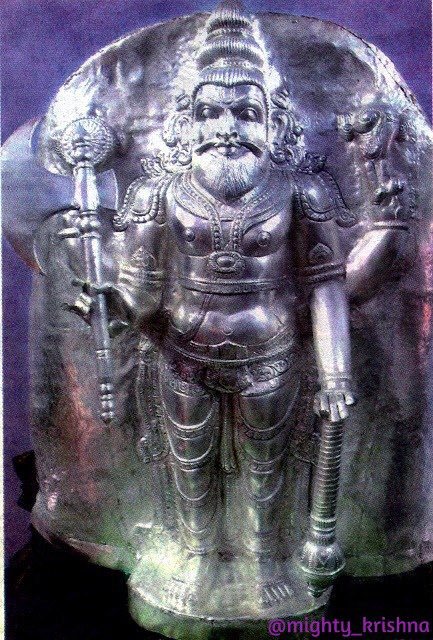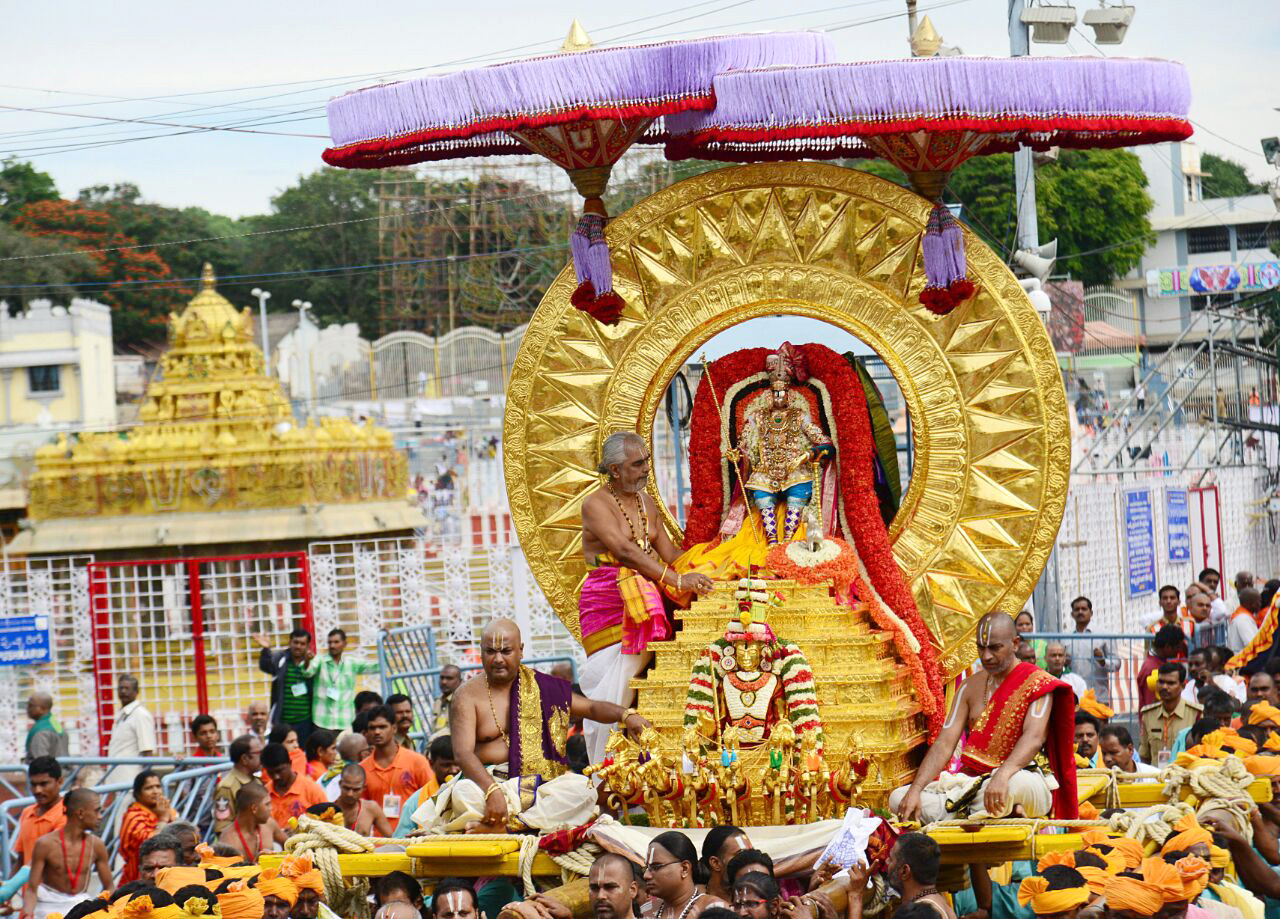In his childhood Krishna had got a friend Sudama. He was from a poor brahman family. Krishna and Sudama studied together at the same teacher Sandipani. Sudama loved Krishna very much.
Once Krishna and Sudama went together to the forest to pick up brushwood. It happened that they stayed in the forest quite a long time and Krishna got hungry, Sudama, meanwhile, had some food. Though Krishna told that he was hungry many times, Sudama felt very shy to propose Him his scanty food. “How can I offer my food to the king’s son? Anyhow, he is from a very rich family and is not accustomed to such ordinary food,” thought he. And when Krishna asked him once more “Sudama, you maybe have at least something,” Sudama answered, “Krishna, I have got nothing.”
Sudama was also hungry. And now when Krishna went aside for a short time, he began to eat stealthily and Krishna noticed it, but he said nothing. Having finished with the brushwood they went apart for homes. Some time passed, studies came to the end. Sudama got married and Krishna took up his king’s throne. Years passed. Sudama got very poor, but he continued loving Krishna very much.
In the same country there lived one petty knight who arduously hated Krishna. Krishna had got a lot of foes who hated him because of the love which multitude of people felt towards Krishna: these were noble men and commoners, men and women. So the enmity towards Krishna especially was directed to the commoners – Krishna’s bhaktas.
The same happened with Sudama. That knight was indignant that Sudama loved Krishna so much and all the time chanted His name. Once he told Sudama, “Repeat my name and I will give you wealth, money, whatever you wish.” But Sudama answered, “No, never will I chant your name. Whatever poor I am staying, I will chant only Krishna’s name.”
Soon it came to the state that Sudama didn’t have any clothes to put on. Children cried of hunger and there were no food to feed them on. Every day wife invoked to Sudama, “You have got so good a friend Krishna. Go to Him and ask for help.” But Sudama answered, “No, He is God, He knows everything. What for shall I go to Him and beg? It is all clear to him anyway!” But his wife insisted, “Still, go and ask Him. It’s even ridiculous, you have got such a friend –the very king, and meanwhile we are so poor. Besides, this knight demands to chant his name and threatens with many troubles. Why do we have to chant his name?”
And really all Sudama’s family loved Krishna dearly. The wife was also his bhakt and chanted his name all the time “Krishna, Krishna, Krishna.”
Having seen at last that his threats don’t work, the knight decided to punish Sudama. He came to his house and hit him.
At this very time Krishna was sitting in His palace together with Rukmani, Sathyabhama and other relatives. Suddenly he felt the pain in the place on which the knight hit Sudama.
Krishna knew everything that happened to Sudama and his family, but he kept silence and did nothing. He needed that Sudama’s soul responded and opened to meet him. And it was necessary to help Sudama get rid of any shyness.
The knight hit Sudama again, just that very moment Krishna perceived the blow and exclaimed, “O-o-o!” Everybody got exited. His wives in agitation began asking, “What happened?!” And nevertheless, Krishna kept silence.
But Sudama even after the punishments of the knight couldn’t come to Krishna and thought as before, that He knows it anyhow and understands everything.
After this event Sudama’s life became unbearable at all. His wife didn’t know what to undertake, and Sudama didn’t want to obey the knight and proceeded to sing bhajans about Krishna.
The knight on seeing such steadfast revering Krishna still more got in rage and vent on punishing Sudama. And when Sudama was being punished, Krishna in his kingdom in Dwaraka was also bad.
At last Sudama’s wife broke down and told, “If you don’t go to Krishna, I myself will go to Krishna to ask for help.” Sudama protested, but the wife was adamant.
And then Sudama brought himself to go, but there appeared another problem. It is not appropriate to go to a friend empty-handed. But in Sudama’s family there were nothing. “I cannot go to my friend empty-handed,’ said Sudama to his wife, ‘and we haven’t got any money so that to buy something.” Then his wife asked for some rice at their neighbours and simply boiled it. This was the same rice as it was formely in the forest at Sudama. He took it and in his plane clothes, singing as usual bhajans of Krishna went to Dwaraka where his great friend reigned.
Krishna’s palace was magnificent. It raptured anyone who has ever seen it by its noble delineation, the subtle stone carving and precious mosaic. Shady gardens and parks with a multitude of blooming lanes and fountains surrounded the palace.
And now Sudama, poor commoner, comes to Dwaraka and finds himself among all this splendour.
Mighty guards met Sudama at the palace gates and barred the way.
“Wait,where are you going?” asked they.
“I want to meet Krishna.”
“Do you want to meet Krishna?” laughed the guards critically looking over his garment.
. “But who are you? Krishna doesn’t meet with such ones.”
“I don’t have other clothes,” answered Sudama modestly, “go and announce Krishna that the friend of his childhood Sudama came,” asked he.
In those times guards understood that if a man speaks so sincerely, it means that it really is the truth and he is trustworthy. They conveyed everything to Krishna.
Krishna knew that Sudama would come. All this time he was waiting that Sudama would stop being shy and venture to meet him. And here came Sudama.
When he entered the palace, Krishna was sitting with Rukmani and other wives and His court circle. On seeing Sudama he swiftly jumped from the throne and dashed to him. “Sudama came!” Enormous joy gripped Krishna. All his wives, the court, friends and guards were astounded by such Krishna’s behavior, “What happened? Who came? A common poor man came, but Krishna is so glad to him,” they were at a loss. He took him for shoulders and told in emotion, “Sudama! I am so glad to see you! How I was waiting for you! How I love you.” They were embracing each other and were both crying.

Then Krishna took Sudama’s hand and held not releasing it. All His wives, all the princesses who were there and saw it were so touched that they began throwing flowers to Sudama’s feet and asked the permission to rub them with expensive oils and incense.
Krishna took Sudama forward, set him in his throne and he himself sat at his feet and asked to bring water: “I myself will wash his feet,” said Krishna. And all those around stood in full perplexity: the Very Krishna washes Sudama’s feet.

Then Sudama had a rest and Krishna served at his feet: Sudama was dreaming and the very Krishna from one side and Rukmini from another, the very Lakshmi and Narayan served at Sudama’s feet.
When Sudama woke up, Krishna asked, “Tell me, Sudama, didn’t your wife give anything for me?” And Sudama again felt embarrassed, but Krishna told, “That’s all, Sudama. If I took your hand into mine, you shouldn’t be shy any more.” Then Sudama passed the rice cooked by his wife. And Krishna, though the most dainty dishes had been served up to his meals, took that rice and ate it. And as soon as he took small handful into his mouth, the situation in Sudama’s home changed immediately. With each handful of rice something changed, as if the old life was finishing and the new one started.
Look, at his childhood Sudama felt shy to offer Krishna his poor meal and then he had been living in distress for many years.
Krishna understood all Sudama’s life circumstances. He even sensed the hit on the back. But for the connection of the soul with the Great Soul there must all the bars be obliterated between them. Otherwise, there will be no connection, and until this there will be no moksh, no realization.
And when the two who love each other so dearly meet, then there isn’t one, isn’t another –both become One (a single). And with such love there is always realization
That is why Krishna told everybody who loved Him, “We are the one. There isn’t the two. There is one”.
And Sudama was the same, – united with Krishna. But in their childhood it happened so, that Krishna sat hungry and Sudama did not share his food with him. He was not greedy, he wanted to share his food with Krishna, but he felt very shy because of his poverty…
When Sudama returned home, the well being lost by him in the past was restored in his family.
In fact, the Lord is so merciful, that even if we pray to Him to develop our faith in Him, to plant that seed of devotion in us, He does. All we have to do is ask.
Just ask. Just pray. Just chant. Just surrender. Just love. Just take shelter of His lotus feet and everything will be fine.
Jai Shree Radhe Krishna

























![Ratha Sapthami/ Surya Jayanti 24/01/2018- A Day Dedicated to the Lord Surya [Sun God]](https://mightykrishna.wordpress.com/wp-content/uploads/2017/02/091010-3a382433-e0f7-484b-b.jpg?w=1200)




